 W
WLancelot Andrewes was an English bishop and scholar, who held high positions in the Church of England during the reigns of Elizabeth I and James I. During the latter's reign, Andrewes served successively as Bishop of Chichester, of Ely, and of Winchester and oversaw the translation of the King James Version of the Bible. In the Church of England he is commemorated on 25 September with a lesser festival.
 W
WArchibald Bennie (1797–1846) was a Scottish minister in the 19th century who became Dean of the Chapel Royal (Scotland) and Chaplain in Ordinary to Queen Victoria in Scotland.
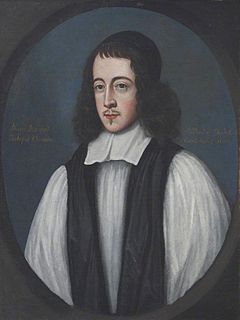 W
WWalter Blandford was an English academic and bishop.
 W
WCharles James Blomfield was a British divine and classicist, and a Church of England bishop for 32 years.
 W
WRichard John Carew Chartres, Baron Chartres,, FBS is a retired bishop of the Church of England. He was area Bishop of Stepney from 1992 to 1995 and Bishop of London from 1995 to 2017. He was sworn of the Privy Council in the same year he became Bishop of London. He was also Gresham Professor of Divinity from 1987 to 1992. In October 2017, Chartres was made a life peer, and now sits in the House of Lords as a crossbencher; he had previously sat in the House as one of the Lords Spiritual.
 W
WHenry Compton was the Bishop of London from 1675 to 1713.
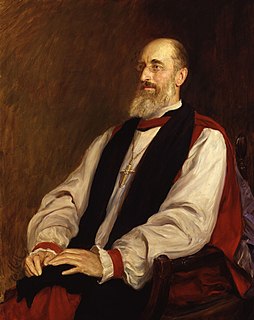 W
WMandell Creighton was a British historian and a bishop of the Church of England. A scholar of the Renaissance papacy, Creighton was the first occupant of the Dixie Chair of Ecclesiastical History at the University of Cambridge, a professorship established around the time that history was emerging as an independent academic discipline. He was also the first editor of the English Historical Review, the oldest English language academic journal in the field of history. Creighton had a second career as a cleric in the Church of England. He served as a parish priest in Embleton, Northumberland and later, successively, as a Canon Residentiary of Worcester Cathedral, the Bishop of Peterborough and the Bishop of London. His moderation and worldliness drew praise from Queen Victoria and won notice from politicians. It was widely thought at the time that Creighton would have become the Archbishop of Canterbury had his early death, at age 57, not supervened.
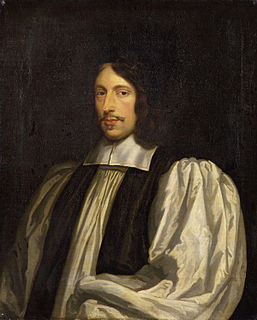 W
WNathaniel Crew, 3rd Baron Crew was Bishop of Oxford from 1671 to 1674, then Bishop of Durham from 1674 to 1721. As such he was one of the longest serving bishops of the Church of England.
 W
WHerbert Croft (1603–1691) was an English churchman, bishop of Hereford from 1661.
 W
WGeoffrey Francis Fisher, Baron Fisher of Lambeth, was an English Anglican priest, and 99th Archbishop of Canterbury, serving from 1945 to 1961.
 W
WEdmund Gibson was a British divine who served as Bishop of Lincoln and Bishop of London, jurist, and antiquary.
 W
WWilliam Howley was a clergyman in the Church of England. He served as Archbishop of Canterbury from 1828 to 1848.
 W
WJohn Jackson was a British divine and a Church of England bishop for 32 years.
 W
WEdmund Lacey was a medieval Bishop of Hereford and Bishop of Exeter in England.
 W
WWilliam Laud was a clergyman in the Church of England, appointed Archbishop of Canterbury by Charles I in 1633. A key advocate of Charles's religious reforms, he was arrested by Parliament in 1640, and executed towards the end of the First English Civil War in January 1645.
 W
WRobert Lowth was a Bishop of the Church of England, Oxford Professor of Poetry and the author of one of the most influential textbooks of English grammar.
 W
WHenry Colville Montgomery Campbell was a Church of England bishop. He was ordained in 1910 and served as vicar or rector in a number of London parishes before being consecrated as a bishop in 1940, holding, successively, the suffragan bishoprics of Willesden and Kensington and the diocesan bishoprics of Guildford and London until his retirement in 1961.
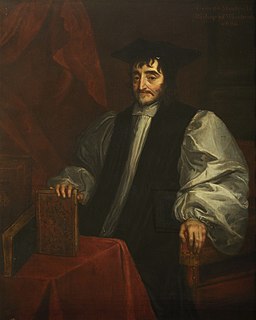 W
WGeorge Morley was an English Anglican bishop, Bishop of Worcester and then of Winchester.
 W
WDame Sarah Elisabeth Mullally, is a British Anglican bishop, Lord Spiritual and former nurse. She has been Bishop of London since 8 March 2018. From 1999 to 2004, she was England's Chief Nursing Officer and the National Health Service's director of patient experience for England; from July 2015 until 2018, she was Bishop of Crediton, a suffragan bishop in the Diocese of Exeter.
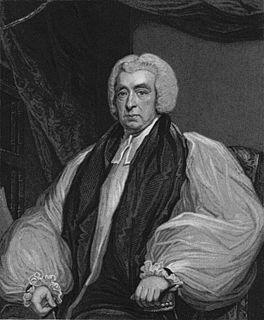 W
WBeilby Porteus, successively Bishop of Chester and of London, was a Church of England reformer and a leading abolitionist in England. He was the first Anglican in a position of authority to seriously challenge the Church's position on slavery.
 W
WJames Ramsay (1672–1749) was a Church of Scotland minister who served twice as Moderator of the General Assembly in both 1738 and 1741. He was Dean of the Chapel Royal from 1716 to 1726. At the time of his death in 1749 he was the acknowledged Father of the Church.
 W
WJohn Randolph was a British scholar, teacher, and cleric who rose to become Bishop of London.
 W
WJohn Robinson was an English diplomat and prelate.
 W
WThomas Savage was a prelate, diplomat and scholar during the Tudor period. Savage served as Chaplain to King Henry VII and was Archbishop of York from 1501 until his death in 1507. Prior his consecration as a Bishop, Savage served as a diplomat and rector. As a diplomat Savage held the positions of English Ambassador to Castile and Portugal, during which time he helped broker the marriage treaty between Arthur, Prince of Wales and Catherine of Aragon in 1489, and later held the position of English Ambassador to France from 1490, where he took part in the conference at Boulogne.
 W
WGilbert Sheldon was the Archbishop of Canterbury from 1663 until his death.
 W
WThomas Sherlock was a British divine who served as a Church of England bishop for 33 years. He is also noted in church history as an important contributor to Christian apologetics.
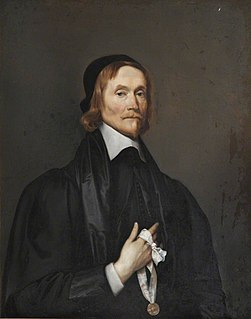 W
WRichard Steward or Stewart was an English royalist churchman, clerk of the closet to Charles I and designated Dean of St. Paul's and Westminster, though not able to take up his position because of the wartime circumstances.
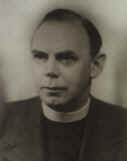 W
WRobert Wright Stopford, was a British Anglican bishop.
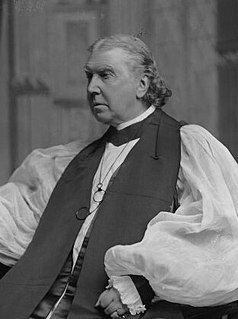 W
WArchibald Campbell Tait was an Archbishop of Canterbury in the Church of England and theologian.
 W
WWilliam Talbot was an English Anglican bishop. He was Bishop of Oxford from 1699 to 1715, Bishop of Salisbury from 1715 to 1722 and Bishop of Durham from 1722 to 1730.
 W
WFrederick Temple was an English academic, teacher and churchman, who served as Bishop of Exeter (1869-1885), Bishop of London (1885-1896) and Archbishop of Canterbury (1896-1902).
 W
WRichard Terrick was a Church of England clergyman who served as Bishop of Peterborough 1757–1764 and Bishop of London 1764–1777.
 W
WJohn Vesey or Veysey (c.1462–1554) was Bishop of Exeter in Devon, from 1519 until his death in 1554, having been briefly deposed 1551-3 by King Edward VI for his opposition to the Reformation.
 W
WJohn William Charles Wand, was an English Anglican bishop. He was the Archbishop of Brisbane in Australia before returning to England to become the Bishop of Bath and Wells before becoming the Bishop of London.
 W
WArthur Foley Winnington-Ingram was Bishop of London from 1901 to 1939.